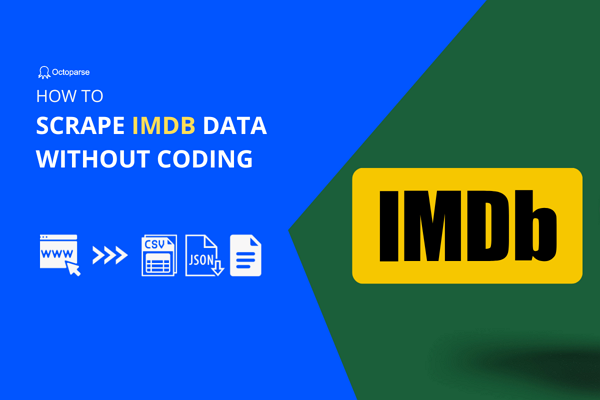
Understanding the Digital Media Landscape
Imagine having instant access to a comprehensive database containing millions of movies, TV shows, and entertainment industry insights. This isn‘t just a fantasy—it‘s the reality offered by IMDb, the internet‘s most extensive media information repository. With over 10 million titles and 11.5 million human records, IMDb represents a goldmine of data for researchers, analysts, and entertainment professionals.
Web scraping has transformed how we interact with massive digital archives, turning unstructured online information into structured, analyzable datasets. In this comprehensive guide, we‘ll explore the intricate world of IMDb data extraction, providing you with cutting-edge techniques, strategic insights, and practical methodologies to unlock the full potential of media information.
The Evolution of Digital Media Data Collection
The journey of media data collection has been nothing short of revolutionary. Just two decades ago, entertainment research required extensive manual documentation, time-consuming archival work, and limited access to comprehensive information. Today, web scraping technologies have democratized data access, enabling researchers and professionals to gather complex datasets with unprecedented speed and precision.
IMDb emerged in 1990 as a grassroots project, initially managed by film enthusiasts who recognized the need for a centralized movie database. What began as a passionate community effort has now transformed into a global platform hosting millions of detailed entertainment records. This evolution mirrors the broader digital transformation happening across information industries.
Legal and Ethical Considerations in Web Scraping
Before diving into technical methodologies, understanding the legal landscape is paramount. Web scraping exists in a nuanced regulatory environment that requires careful navigation.
Navigating IMDb‘s Terms of Service
IMDb‘s current usage policies mandate responsible data extraction. While the platform allows certain non-commercial uses, commercial exploitation requires explicit permission. Key considerations include:
- Respecting copyright restrictions
- Avoiding excessive server load
- Maintaining data integrity
- Providing appropriate attribution
- Preventing unauthorized redistribution
Ethical Data Extraction Principles
Responsible web scraping transcends mere technical capability—it represents a commitment to ethical information gathering. Professional scrapers must:
- Implement rate limiting mechanisms
- Avoid overwhelming server resources
- Protect individual privacy
- Maintain transparency in data collection
- Adhere to platform-specific guidelines
Technical Foundations of IMDb Data Extraction
Comprehensive Scraping Approaches
Web scraping IMDb data requires a multi-dimensional approach, combining various technological strategies:
Python-Powered Extraction
Python remains the premier language for web scraping, offering robust libraries and flexible implementation strategies. Libraries like BeautifulSoup, Scrapy, and Selenium provide powerful tools for navigating complex web structures.
import requests
from bs4 import BeautifulSoup
def extract_movie_details(url):
response = requests.get(url, headers={‘User-Agent‘: ‘Professional Research Tool‘})
soup = BeautifulSoup(response.text, ‘html.parser‘)
movie_data = {
‘title‘: soup.select_one(‘.title-header‘).text,
‘rating‘: float(soup.select_one(‘.ratings-bar strong‘).text),
‘genre‘: [genre.text for genre in soup.select(‘.genre-list‘)]
}
return movie_dataAdvanced Selenium Dynamic Scraping
For websites with complex JavaScript rendering, Selenium offers dynamic interaction capabilities:
from selenium import webdriver
from selenium.webdriver.common.by import By
def dynamic_imdb_scraper():
driver = webdriver.Chrome()
driver.get(‘https://www.imdb.com/chart/top‘)
movies = driver.find_elements(By.CSS_SELECTOR, ‘.movie-list-item‘)
extracted_data = [process_movie_element(movie) for movie in movies]
return extracted_dataData Processing and Analysis Strategies
Transforming Raw Data into Insights
Successful web scraping extends beyond mere data collection. The real value emerges through sophisticated processing techniques:
Data Cleaning
- Remove duplicate entries
- Standardize formatting
- Handle missing values
- Normalize data structures
Advanced Analysis Approaches
- Sentiment analysis of reviews
- Trend identification algorithms
- Predictive modeling techniques
- Genre performance tracking
Performance Optimization Techniques
Efficient web scraping demands strategic resource management. Key optimization strategies include:
- Implementing concurrent scraping
- Utilizing proxy rotation
- Caching intermediate results
- Minimizing unnecessary network requests
Emerging Trends in Media Data Extraction
The future of web scraping is rapidly evolving, driven by technological advancements:
- AI-Enhanced Scraping
- Machine learning data enrichment
- Real-time media trend analysis
- Cross-platform data integration
Conclusion: Navigating the Future of Media Research
Web scraping IMDb represents more than technical expertise—it‘s about understanding the complex ecosystem of global entertainment. By mastering these techniques, researchers can unlock unprecedented insights into media landscapes.
Strategic Recommendations
- Continuously update technical skills
- Maintain ethical data collection practices
- Invest in robust infrastructure
- Stay adaptable to technological changes
Recommended Resources
- Scrapy Documentation
- BeautifulSoup Tutorials
- Selenium WebDriver Guide
- IMDb Developer Resources
By embracing these comprehensive strategies, you‘ll transform from a casual data collector to a sophisticated media research professional.










